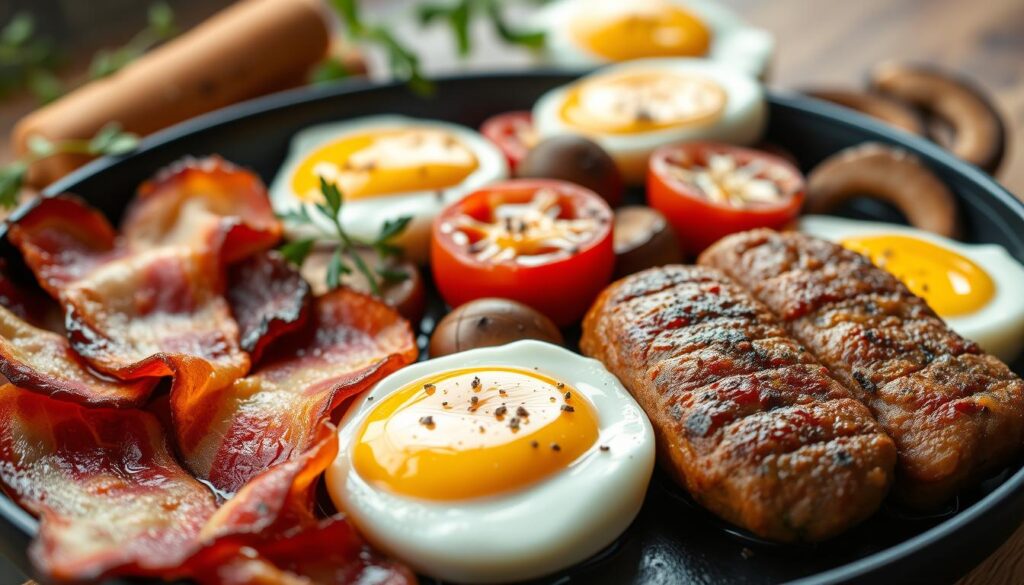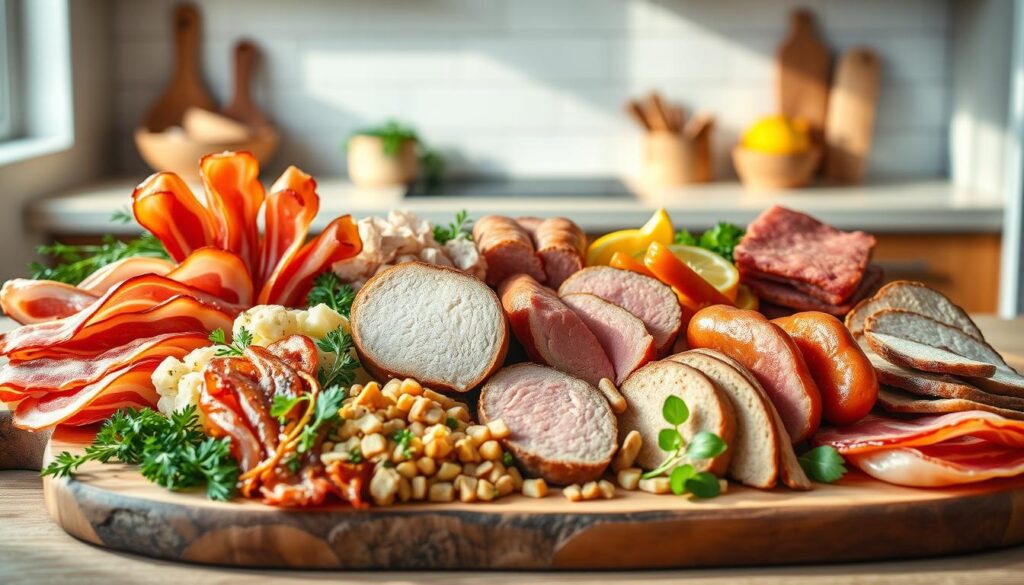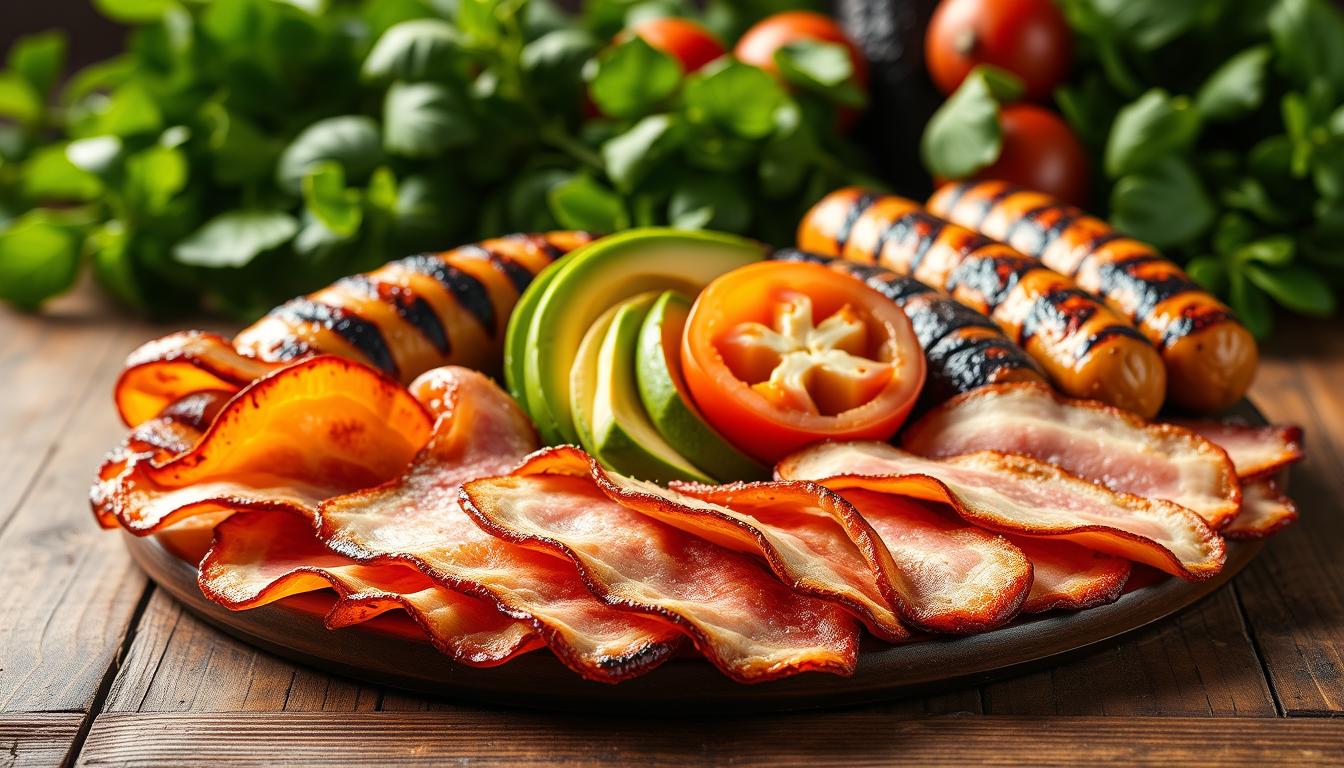Healthy Breakfast Meats to Power Up Your Morning
Starting your day with a nutritious breakfast boosts your energy and well-being. You want a meal that’s tasty and full of protein to last until lunch.
Lean proteins like chicken, turkey, and salmon are great for breakfast. You can also try lower-fat options like turkey sausage or Canadian bacon. They add flavor and satisfaction to your morning.
With so many choices, picking the right breakfast meats can be tough. But, by choosing lean and nutritious options, you can make a healthy breakfast. This supports your diet and tastes good too.
Why Choose Healthy Breakfast Meats?
Healthy breakfast meats are more than just a meal; they’re a step towards a healthier lifestyle. Choosing the right breakfast meats fuels your body for the day. It also makes a big impact on your health and wellbeing.

Benefits of Lean Proteins
Lean proteins are key to a healthy breakfast. They give your body essential amino acids for building and repairing tissues. Unlike processed meats, lean proteins do this without the bad fats and cholesterol.
- Support muscle growth and repair
- Help in maintaining healthy bones
- Can aid in weight management by keeping you fuller for longer
Supporting Muscle Health
Muscle health is vital for mobility, strength, and overall health. Eating lean proteins at breakfast helps support muscle health. This is great for those who are active or want to keep muscle mass as they age.
Incorporating healthy breakfast meats into your diet can be a simple yet effective way to support your muscle health.
Aiding Weight Management
Healthy breakfast meats can also help with weight management. Lean proteins take more energy to digest, which boosts your metabolism. They also help you feel full longer, making it easier to eat healthy.
- Boosts metabolism
- Reduces hunger and supports satiety
- Supports a balanced diet
By choosing unprocessed breakfast meat, you get a nutritious breakfast. It also supports your health goals.
Popular Healthy Breakfast Meat Options
Start your day with healthier breakfast meat choices. They are tasty and good for you. Look for options with less saturated fats and sodium.

Turkey Bacon
Turkey bacon is a great alternative to regular bacon. It has less fat and fewer calories. Choose unprocessed turkey bacon to avoid preservatives.
Chicken Sausage
Chicken sausage is a healthy breakfast meat choice. It’s made with lean protein and has less sodium than regular sausage. Check labels for low-salt and preservative-free options.
Veggie and Plant-Based Options
Veggie and plant-based sausages are good unprocessed breakfast meat alternatives. They’re made from tofu, tempeh, or seitan. These options are healthier and fit vegetarian and vegan diets.
When picking your breakfast meat, think about its nutritional value and ingredients. Choosing healthier, less processed options can greatly improve your diet.
Nutritional Value of Common Meats
To make a good choice for breakfast, you need to know about the nutritional value of meats. Different meats have different nutritional values. This affects your health and wellbeing.
Comparing Proteins: Turkey vs. beef
Turkey has less saturated fat and calories than beef. This makes turkey a great choice for those watching their weight. Turkey is also packed with protein, which is key for muscle repair and growth.
beef, on the other hand, has more fat but also vitamins like B12 and zinc. It’s important to pick leaner cuts of beef and watch your portion sizes.
Understanding Sodium Content
It’s important to know the sodium in breakfast meats because too much sodium can harm your heart. Many breakfast meats, like sausages and bacon, have a lot of sodium.
To cut down on sodium, choose low-sodium versions of your favorite meats. Or go for products that say “no salt added.”
Evaluating Fats in Breakfast Meats
It’s key to check the fats in breakfast meats for healthy choices. Some fats are good for energy and nutrients, but too much of the wrong kinds can be bad.
Opt for meats low in saturated fats and without trans fats. Look for products made with turkey or chicken for better fat profiles.
How to Cook Healthy Meat Breakfast
Preparing a nutritious breakfast starts with how you cook your meat. The right cooking method keeps the meat’s nutrients and avoids unhealthy fats.
Grilling vs. Pan-Frying
Grilling and pan-frying are common ways to cook breakfast meats. Grilling lets fat drip off, making it leaner. Pan-frying, though, can soak the meat in fat, unless you use very little oil.
Choosing the right oil, like olive or avocado, can make pan-frying healthier.
Comparison of Grilling and Pan-Frying:
| Cooking Method | Fat Retention | Health Considerations |
|---|---|---|
| Grilling | Lower | Allows fat to drip away |
| Pan-Frying | Higher | Can be healthy with minimal oil |
Baking and Air Frying Techniques
Baking and air frying are healthier ways to cook breakfast meats. Baking cooks evenly without extra fat. Air frying uses a bit of oil for a crispy texture, like deep-frying.
To bake, put the meat on a parchment-lined baking sheet. Bake at 375°F (190°C) for the recommended time. For air frying, follow the maker’s guide for temperature and time.
Using these methods, you can enjoy your favorite breakfast meats healthily. Whether grilling, baking, or air frying, focus on the technique and ingredients.
Healthier Alternatives to Traditional Meats
Start your day with a healthier twist on traditional breakfast meats. Looking to cut down on saturated fats, cholesterol, and sodium? There are many alternatives to try.
Plant-Based Sausages
Plant-based sausages are a hit for a healthier breakfast. Made from tofu, tempeh, or seitan, they’re mixed with veggies and spices. They have less saturated fat and no cholesterol, making them good for your heart.
When picking plant-based sausages, choose ones low in sodium and made with good ingredients.
Smoked Salmon Benefits
Smoked salmon is a tasty and healthy breakfast choice. It’s full of omega-3 fatty acids, which are great for your heart. It also gives you protein to keep you going in the morning.
It’s packed with vitamins and minerals like vitamin D and selenium. Go for sustainably sourced, low-sodium smoked salmon.
Try smoked salmon with whole-grain bagels or toast, or in omelets and scrambled eggs. Its flavor and health benefits make it a top breakfast pick.
Tips for Choosing Quality Meats
Choosing the right meats for breakfast is key to a healthy start. With many options, picking the best can be tough.
Reading Labels Effectively
Reading labels is vital when picking breakfast meats. Look for added preservatives, high sodium, and terms like “uncured” and “nitrate-free.” Knowing these helps pick quality meats that fit your diet.
Here’s what to check on the label:
- Watch for unwanted additives in the ingredient list.
- Choose meats with less sodium.
- Know the difference between “uncured” and “cured” meats.
Understanding Additives and Preservatives
Additives and preservatives make breakfast meats taste better and last longer. But, some can harm your health. It’s important to know what you eat.
| Additive/Preservative | Description | Health Impact |
|---|---|---|
| Nitrates/Nitrites | Used to preserve color and flavor | Potential link to cancer |
| Sodium | Enhances flavor | High blood pressure risk |
| Artificial Flavorings | Adds taste | Potential allergic reactions |
Knowing about these additives helps you choose better for a balanced diet.
Portion Control: How Much is Enough?
Controlling your portions is key to enjoying healthy breakfast meats the right way. When choosing how much breakfast meat to eat, think about your hunger and dietary needs.
Recommended Serving Sizes
The right amount of breakfast meats like sausage or bacon is about 2-3 ounces. That’s around 55-85 grams. To understand this better, a standard serving size is like the size of a deck of cards.
- A serving of turkey bacon is usually 2-3 slices.
- For chicken sausage, a serving size is often one to two sausages, depending on their size.
Knowing these serving sizes helps you enjoy your favorite breakfast meats without overeating.
Balancing with Other Breakfast Foods
It’s important to balance your breakfast meats with other foods. Try to include whole grains, fruits, and vegetables in your meal.
- Pair your breakfast meat with whole-grain toast or oatmeal for complex carbohydrates.
- Add some fruits or vegetables on the side to increase the nutrient density of your meal.
This way, you’ll have a satisfying breakfast and get the nutrients you need to start your day right.
Understanding portion control and balancing your breakfast is vital for your health. By being mindful of your serving sizes and adding other nutritious foods to your healthiest breakfast meat, you can have a delicious and healthy meal.
Incorporating Meats into a Balanced Breakfast
Adding healthy meats to your breakfast can make it more nutritious. A balanced breakfast with protein-rich meats keeps you full until lunchtime.
Pairing Proteins with Whole Grains
Combining proteins with whole grains gives you energy all morning. Grains like oats, quinoa, and whole wheat are full of fiber and vitamins. They pair well with protein-rich meats for a healthy meal.
Try turkey bacon with oatmeal or scrambled eggs with whole wheat toast. These combos are tasty and start your day off right.
Adding Fruits and Vegetables
Fruits and vegetables make your breakfast even better. Berries, bananas, and citrus fruits are full of vitamins. Spinach, bell peppers, and mushrooms add fiber and nutrients.
It’s easy to add these to your breakfast. Mix spinach into scrambled eggs or have fresh fruit with unprocessed breakfast meat. This adds variety and health benefits.
By mixing proteins, whole grains, fruits, and vegetables, you get a nutritious breakfast. Try different mixes to find your favorite.
The Role of Breakfast Meats in Various Diets
Different diets need different breakfast meats. This includes keto, Mediterranean, and more. Knowing how meats fit into these diets helps you make better choices.
Keto and Low-Carb Diets
On a keto or low-carb diet, breakfast meats are key. They’re full of fat and protein. Foods like bacon, sausage, and ham keep you full and in ketosis.
When picking breakfast meats, watch the ingredients and nutrition. Choose meats with minimal processing and no added sugars.
| Breakfast Meat | Protein Content | Fat Content |
|---|---|---|
| Bacon | 12g | 35g |
| Sausage | 15g | 30g |
| Ham | 18g | 10g |
Mediterranean Diet Choices
The Mediterranean diet focuses on lean proteins and healthy fats. For breakfast, try turkey bacon or chicken sausage. They’re low in saturated fats and high in protein.
For a Mediterranean diet, pick meats with omega-3 fatty acids and antioxidants. Smoked salmon is a great choice, adding healthy fats and protein to your meal.
Choosing the right breakfast meats makes your morning delicious and healthy. It doesn’t matter what diet you follow.
Common Myths About Breakfast Meats
Some common beliefs about breakfast meats are not true. Many myths surround these foods, like their fat and calorie content. Knowing the truth helps you choose better for breakfast.
Debunking Fat Myths
Many think all breakfast meats are full of unhealthy fats. But, not all fats are bad. Turkey or chicken sausages are leaner than traditional beef sausages or bacon.
Choosing the right type of breakfast meat can lower your saturated fat intake. Turkey bacon or chicken sausage are better choices. Here’s a comparison:
| Breakfast Meat | Fat Content per Serving | Calories per Serving |
|---|---|---|
| Traditional Bacon | 12g | 250 |
| Turkey Bacon | 4g | 120 |
| Chicken Sausage | 6g | 180 |
Misunderstandings About Calories
Another myth is that all breakfast meats are calorie-dense. While some are, portion control is key. Even healthy options can lead to weight gain if eaten too much.
Consider the calorie counts of different breakfast meats. A serving size, like a few slices of bacon or a couple of sausages, can vary a lot in calories.
When picking breakfast meats, read labels well and know what’s in your food. Choose options labeled as “low sodium” or “no added nitrates” for a healthier choice.
By understanding the myths and nutritional facts, you can enjoy a healthy meat breakfast that fits your dietary goals.
Meal Prep with Healthy Breakfast Meats
Planning ahead lets you enjoy healthy breakfast meats all week. Meal prep saves time and keeps your meals nutritious. Start your day right with a healthy breakfast.
Easy Recipes to Try
Start by cooking a big batch of your favorite protein on the weekend. Use it all week in different meals. For instance, make a lot of turkey sausage or chicken bacon and divide it into portions.
Here are some easy recipes to try:
- Turkey and Avocado Wrap: Slice cooked turkey sausage, add to a whole-grain wrap with avocado, and refrigerate or freeze for up to 3 days.
- Breakfast Burrito: Scramble eggs, add diced chicken sausage, and wrap in a whole-grain tortilla. Store in the fridge or freezer for a quick breakfast.
- Breakfast Skillet: Cook diced healthy breakfast meats with vegetables like bell peppers and onions. Portion into individual containers and reheat as needed.
Storing and Reheating Tips
Storing and reheating your meal prep right is key. Use airtight containers to keep the meat fresh. This stops moisture and flavors from getting in.
For reheating, try the microwave, oven, or stovetop. Here’s how:
- Microwave: Reheat on high for 20-30 seconds or until the meat is hot and steaming.
- Oven: Reheat at 350°F (175°C) for 5-10 minutes or until the meat is hot and cooked through.
- Stovetop: Reheat over medium heat, stirring occasionally, until the meat is hot and steaming.
Conclusion: Making Informed Choices
When choosing breakfast meats, it’s important to make smart choices. Adding different types of unprocessed meats to your diet can give you important nutrients and taste.
Balancing Your Breakfast Plate
For a healthy breakfast, mix proteins, whole grains, fruits, and veggies. Try pairing turkey bacon or chicken sausage with whole-grain toast and fresh fruits.
Moderation is Key
Even healthy meats should be eaten in moderation. Watch your portion sizes and sodium to keep your breakfast nutritious and healthy.
By choosing a balanced breakfast, you can enjoy the good things about healthy meats. Focus on unprocessed meats and pair them with other healthy foods for a great start to your day.

